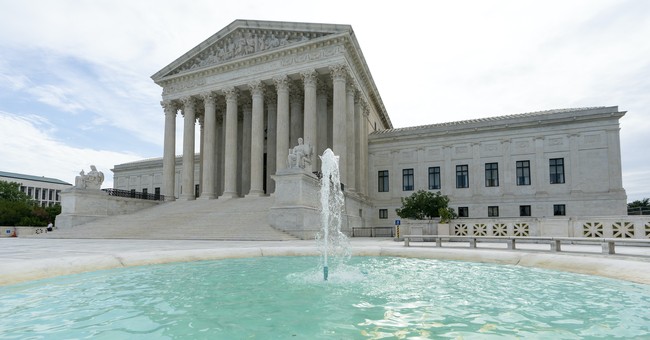
This is a continuation of the story I wrote yesterday about the Wisconsin Supreme Court having issued a decision that established the right of the Wisconsin Legislature to litigate on behalf of the State over the issue of the validity of a Wisconsin statute when the Attorney General for Wisconsin refused to do so.
As I noted in more detail yesterday, the underlying facts are that Federal District Court Judge William Conley — an Obama Appointee — issued an injunction prohibiting enforcement of certain election laws in Wisconsin due to COVID 19, and by doing so he extended the period under Wisconsin law for voter registration by 7 days; required that voters be given notice of expanded eligibility to vote by absentee ballot; extended the deadline for receiving ballots from Nov. 3 to Nov. 9, so long as the ballot is postmarked on or before Nov. 3; blocked a Wisconsin law that allows only for delivery by mail of absentee ballots; expanded availability by email to receive such ballots; and prohibited enforcement of the Wisconsin statute requiring poll watchers to be residents of the county where they serve in that capacity. The injunction was granted to Democrat party interest groups in a suit where the State offered only token opposition/defense by the Wisconsin Attorney General — who happens to be a Democrat elected in Nov. 2018.
The Wisconsin Legislature, Wisconsin GOP, and the Republican National Committee all sought to intervene/appeal in the Seventh Circuit Court of Appeals to block the injunction from going into effect. The Seventh Circuit initially stayed the Judge Conley’s order pending the outcome of the appeal, but two days after doing so the Seventh Circuit dismissed the appeal on the basis that none of the three parties seeking to intervene had legal “standing” standing to challenge the order. The two political organizations were not ordered to do anything by the district court judge, and they could not show they would be harmed.
As for the Legislature, the Seventh Circuit held it was unclear under Wisconsin state law whether the Legislature could step in and defend a state statute when the Attorney General refused to do so. The Seventh Circuit asked the Wisconsin Supreme Court to decide that matter as an issue of state law before the Seventh Circuit would consider the merits of an appeal brought by the Legislature.
Yesterday the Wisconsin Supreme Court issued an opinion finding that the Legislature was authorized by state law to litigate on behalf of Wisconsin when the constitutionality of a validly passed statute is at issue, and the Attorney General declines to defend the statute. Since Judge Conley’s injunction is premised on a finding that the plaintiffs, in that case, will likely succeed in their claim that the Wisconsin election laws violate the 14th Amendment (don’t ask why) during a time of the pandemic, that decision fell within the provision of state law which triggered the Legislature’s authority to defend the statute in court.
With that clarification in hand, the Wisconsin Legislature sought reconsideration in the Seventh Circuit of the decision a few days ago that the Legislature lacked standing, and asked the Seventh Circuit to rule on its petition for an Emergency Stay blocking Judge Conley’s order from going into effect for the Nov. election. Earlier today the Seventh Circuit granted the motion for reconsideration and found in favor of the Legislature with regard to its challenge of Judge Conley’s order.
There is some excellent language in the Seventh Circuit decision addressing this usurpation of authority by federal district court judges who take it upon themselves to rewrite state election laws to better suit their liking on the eve of an election, using COVID 19 as justification.
The [Supreme Court] Justices have deprecated but not forbidden all change close to an election. A last-minute event may require a last-minute reaction. But it is not possible to describe COVID-19 as a last-minute event. The World Health Organization declared a pandemic seven months ago, the State of Wisconsin closed many businesses and required social distancing last March, and the state has conducted two elections (April and August) during the pandemic. If the judge had issued an order in May based on April’s experience, it could not be called untimely. By waiting until September, however, the district court acted too close to the election.
The district judge also assumed that the design of adjustments during a pandemic is a judicial task. This is doubtful, as Justice Kavanaugh observed in connection with the Supreme Court’s recent stay of another injunction issued close to the upcoming election. Andino v. Middleton, No. 20A55 (U.S. Oct. 5, 2020) (Kavanaugh, J., concurring). The Supreme Court has held that the design of electoral procedures is a legislative task. See, e.g., Rucho v. Common Cause, 139 S. Ct. 2484 (2019); Burdick v. Takushi, 504 U.S. 428 (1992).
Deciding how best to cope with difficulties caused by disease is principally a task for the elected branches of government. This is one implication of Jacobson v. Massachusetts, 197 U.S. 11 (1905), and has been central to our own decisions that have addressed requests for the Judicial Branch to supersede political officials’ choices about how to deal with the pandemic
The language here probably eliminates any other judicial redesign of state election laws in any state that is within the Seventh Circuit, and it will lend support in other Circuits where the outcome is similar. If another Circuit should go the opposite direction and uphold a late judicial change to state election laws, the issue would certainly go back to the Supreme Court.




